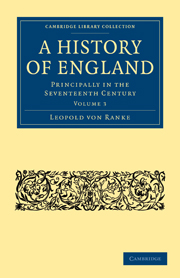Book contents
- Frontmatter
- Contents
- BOOK XI THE COMMONWEALTH IN ENGLAND, 1649—1653
- BOOK XII THE PROTECTORATE OF OLIVER CROMWELL, 1653–1658
- CHAP. I Oliver Cromwell and his elevation to the Protectorate
- CHAP. II Embassy to Sweden. Peace with Holland
- CHAP. III The Parliament of 1654
- CHAP. IV Military government. Religious tolerance
- CHAP. V Rupture with Spain
- CHAP. VI The Parliament of 1656, 1657. Idea of a Cromwellian Monarchy
- CHAP. VII The general position of the Protectorate at home and abroad in 1657 and 1658
- CHAP. VIII Death of Oliver Cromwell
- BOOK XIII FALL OF THE PROTECTORATE AND THE COMMONWEALTH. RESTORATION OF THE MONARCHY, 1658—1660
- BOOK XIV THE FIRST FIVE YEARS UNDER CHARLES II. THE RESTORATION OF THE ANGLICAN CHURCH
- BOOK XV THE DUTCH WARS OF CHARLES II. ESTABLISHMENT OF THE PROTESTANT AND PARLIAMENTARY CHARACTER OF THE CONSTITUTION 1664—1674
CHAP. VI - The Parliament of 1656, 1657. Idea of a Cromwellian Monarchy
Published online by Cambridge University Press: 07 June 2011
- Frontmatter
- Contents
- BOOK XI THE COMMONWEALTH IN ENGLAND, 1649—1653
- BOOK XII THE PROTECTORATE OF OLIVER CROMWELL, 1653–1658
- CHAP. I Oliver Cromwell and his elevation to the Protectorate
- CHAP. II Embassy to Sweden. Peace with Holland
- CHAP. III The Parliament of 1654
- CHAP. IV Military government. Religious tolerance
- CHAP. V Rupture with Spain
- CHAP. VI The Parliament of 1656, 1657. Idea of a Cromwellian Monarchy
- CHAP. VII The general position of the Protectorate at home and abroad in 1657 and 1658
- CHAP. VIII Death of Oliver Cromwell
- BOOK XIII FALL OF THE PROTECTORATE AND THE COMMONWEALTH. RESTORATION OF THE MONARCHY, 1658—1660
- BOOK XIV THE FIRST FIVE YEARS UNDER CHARLES II. THE RESTORATION OF THE ANGLICAN CHURCH
- BOOK XV THE DUTCH WARS OF CHARLES II. ESTABLISHMENT OF THE PROTESTANT AND PARLIAMENTARY CHARACTER OF THE CONSTITUTION 1664—1674
Summary
It was specially with the view of enabling himself to prosecute the war he had undertaken, that Cromwell resolved to summon a Parliament.
Already the revenues were far from meeting the current expenditure, which exceeded them by more than a third. The amount of debt had considerably increased since the close of the Long Parliament: it nearly equalled the yearly income. But now that war had been declared against Spain an immense outlay was necessary. Two fresh fleets had to be equipped, and at the sole cost of England. For there had been no mention of French subsidies in the last treaty, which had reference only to the restoration of commercial intercourse.
In the spring of 1656 we find that the major-generals met in London, and consulted with the Council of State as to the best means of covering the deficit. It was proposed either to raise by half the land-tax imposed upon the Cavaliers, or else, following the old practice of the monarchy, to decree a forced loan from private persons of wealth. The first scheme the Generals regarded as impracticable, from the second they expected but small results, considering the prevalent state of feeling and the decay of trade. They fell back upon a general tax, to be assessed according to property, as the only resource open to them; a scheme which we are told that Cromwell long and obstinately resisted, but finally yielded to the representations of the members.
- Type
- Chapter
- Information
- A History of EnglandPrincipally in the Seventeenth Century, pp. 166 - 184Publisher: Cambridge University PressPrint publication year: 2010First published in: 1875

